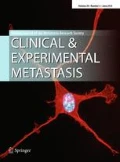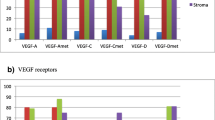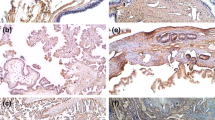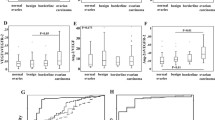Abstract
Angiogenic factors are involved in tumor growth and spread. The aim of this study was to evaluate the expression of angiogenesis-related genes in malignant serous effusions of patients with advanced-stage (FIGO stage III and IV) ovarian carcinoma. In addition, to compare the results for carcinoma cells in effusions with corresponding primary tumors and metastatic lesions, and analyze their prognostic role. Sections from 66 effusions and 90 primary and metastatic lesions from 62 ovarian and primary peritoneal carcinoma patients, were evaluated for expression of basic fibroblast factor (bFGF), interleukin-8 (IL-8), and vascular endothelial growth factor (VEGF) using mRNA in situ hybridization (ISH). Protein expression was evaluated in a subset of specimens using immunohistochemistry (IHC). ISH results were correlated with clinical parameters. In both effusions and solid tumors, bFGF mRNA was the most commonly expressed factor (93% of effusions and 95% of solid tumors) followed by IL-8, while VEGF was expressed in a minority of the specimens (P<0.001 for bFGF vs. IL-8 and VEGF). In solid tumors, angiogenic mRNA expression was seen in both tumor and stromal cells in the majority of positive cases. ISH results did not differ in primary and metastatic tumors. However, carcinoma cells in effusions showed down-regulated expression of VEGF, when compared with both primary tumors (P=0.029) and metastases (P=0.015). IL-8 showed a similar down-regulation in effusions, when compared with metastases (P=0.005). IHC showed excellent agreement with mRNA findings on protein level. In the study of clinico-pathologic parameters, IL-8 mRNA expression in effusions was associated with higher tumor grade (P=0.044). Angiogenic gene expression in effusions showed no correlation with patient age, previous treatment, residual tumor size, FIGO stage or disease outcome in survival analysis (P>0.05). Peritoneal and pleural effusions showed similar expression patterns. In conclusion, bFGF is the major angiogenic factor expressed in ovarian carcinoma at the mRNA level. It is highly expressed in both solid tumors and serous effusions, while IL-8 and VEGF are down regulated in carcinoma cells in effusions, possibly due to the lack of interaction with stromal cells. mRNA expression of VEGF, bFGF, and IL-8 does not appear to be a predictor of disease outcome in advanced-stage ovarian carcinoma. Carcinoma cells in pleural and peritoneal effusions show a similar metastatic expression profile, in agreement with our previous findings, supporting the true metastatic nature of ovarian carcinoma cells in ascites.
Similar content being viewed by others
Author information
Authors and Affiliations
Additional information
(R.R. is affiliated with the David R. Bloom Center for Pharmacy at the Hebrew University)
affiliated with Sackler School of Medicine, Tel-Aviv University
Rights and permissions
About this article
Cite this article
Davidson, B., Reich, R., Kopolovic, J. et al. Interleukin-8 and vascular endothelial growth factor mRNA and protein levels are down-regulated in ovarian carcinoma cells in serous effusions. Clin Exp Metastasis 19, 135–144 (2002). https://doi.org/10.1023/A:1014582911680
Issue Date:
DOI: https://doi.org/10.1023/A:1014582911680




